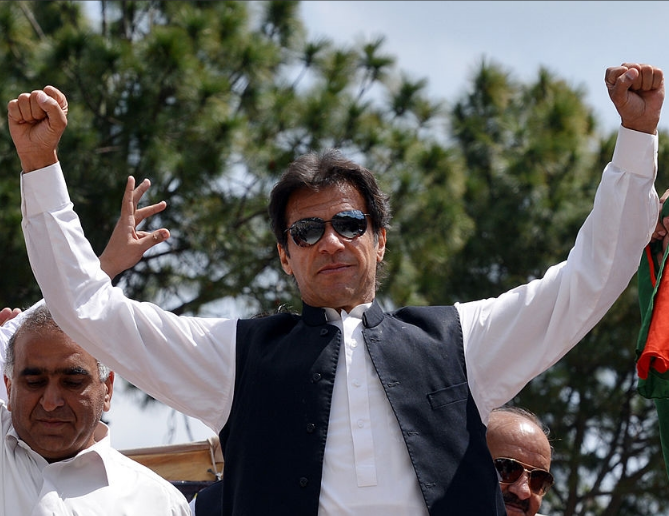
Independence day this time around will arguably result in one of the largest political showdowns in Pakistan’s short democratic history, with the Pakistan Tehreek Insaaf’s rallying cry for electoral reform being pitted up against the ruling Pakistan Muslim League, where the latter continues to promise economic stability and an end to the lingering energy crisis. Adding to the drama on the 14th is the PML-N’s decision to invoke Article 245 which empowers the Pakistan armed forces to defend the country against terrorism under the ambit of civil power. For the government’s detractors, this move is seen as a deliberate attempt to subjugate the PTI’s long march, which considers the mandate of the people of Pakistan to be successfully stolen in the country’s first ever democratic transition in 2013. For the PML-N advocates, however, this move focuses on thwarting potential terrorist attacks in the capital, as the nation continues to be embroiled in Operation Zarb-e-Azb, and braces for potential blow backs.
As an avid supporter for PTI’s ideology, policies and vision for a prosperous Pakistan as a prime example of a welfare state and a self-reliant, corruption free nation, this move by the party to launch a long march which aims at defying the legitimacy of the ruling government, baffles me to the very core. For a political party which promises to uproot the tenets of corruption in the country, leading a march to pressurize the Prime Minister to resign is a chilling overture, given the fragile nature of Pakistan’s democracy. Looking back the chairman had expressed his confidence in the then-election commissioner Fakhruddin G Ibrahim in the lead up to the 2013 ballot box and had also accepted defeat prior to the results being announced. The rallying cry for the 14th of August march boils down to ballot boxes and results which were toed within what is regarded by PTI members as a classic case of election rigging. Articulation of these demands in a democracy is every political party’s sovereign right but it is the means of achieving the goals of uprooting corruption during the elections which is alarming and which could severely taint the PTI’s image.
For many Pakistanis, Imran Khan is a heartthrob and a visionary who could lead the country away from the abyss and towards prosperity. In a nation which is dominated by clientele politics, however, Khan is unfortunately viewed as a celebrity outsider who fails to have the same visible clout in mobilizing masses as he had done quite successfully on the cricket pitch. His fragile image in some sections of Pakistani society could hence be reinforced or even strengthened in light of the decision to take to the streets amid heightened tension at a critical hour in Pakistan’s history. What makes it worse is that much of the PML-N’s reservations over the long march make perfect sense.
What could be a better example according to the PTI’s detractors of derailing a crippled democratic system where electoral reforms are articulated on the streets instead of the main deliberative body which is the ‘Majlis E Shoora’ or the parliament? The use of force and violence also impends, given that an attempt to subjugate the protests could spiral into something unwarranted, allowing a vacuum for the military to intervene. Similarly, the presence of a controversial Canadian cleric in the entire episode, adds to the speculation that supporters of dictatorial regimes in Pakistan are actually aiming to overthrow the PML-N government, which came into power through a controversial democratic transition.
For a democratic party such as the PTI, being associated with dictatorship conspiracies is a damning indictment. The party which hinges on principles of democratic freedom and an end to bureaucratic corruption could easily fizzle out into isolation if this march spirals into something with detrimental consequences. For a celebrity such as Imran, this could potentially dent his popularity as a leader who champions the cause of his nation before his vested interests. What further complicates the PTI’s overture is that the PML-N is ruling within the framework of Pakistan’s democratic system which puts them at an advantage for vilifying the PTI’s decision to resort to the streets instead of the parliament for electoral reforms. This is despite the fact that the PTI’s supporters considered the decision to table their demands in the parliament to be futile, which has meant that instigating pressure in this manner appears to be the only line of action left for them.
For political parties in general, let alone the PTI, a call for an elected Prime Minister by leading long marches into the capital regardless of the circumstances, could result in political isolation in a country which has an illustrious history of democracy being thwarted. At the societal level, political isolation is also possible due to many of Pakistan’s illiterate population failing to understand the concepts of ‘welfare’ and ‘prosperity.’ These scapegoats could continue to be exploited further, given that the government now has an excuse to push Khan and his allies into a corner. For any politician, this would be a classic case of self-capitulation, especially amid growing calls that the PTI is being supported by the Pakistani military bureaucracy as well as being backed up by the tainted PML-Q and Dr. Tahir Ul Qadri’s Minhaj Ul Quran. Had the PTI been more pragmatic with this issue, a political showdown of such proportions could have easily been averted.
More importantly however, the PTI’s image as a political party that respects democracy could have been reinforced in the eyes of the common man which could have added to Imran’s clout. If the party continues to be uncompromising, it could easily descend into isolation, which for any entity is equivalent to committing political suicide.
***
Image: Aamir Qureshi-AFP, Getty